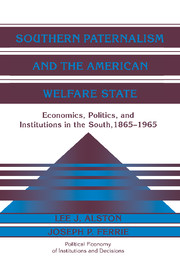 Southern Paternalism and the American Welfare State
Southern Paternalism and the American Welfare State Published online by Cambridge University Press: 05 May 2010
Introduction
For much of the century between the end of the Civil War and the 1960s, paternalism was an important aspect of the rural way of life in the American South. In fact, the clearest difference between labor markets in the South and those in the rest of the United States was the elaborate system of paternalism that shaped most of the South's agricultural labor arrangements. We imply no value judgments by our use of the term “paternalism.” By paternalism – or the term “patron-client relationship” which we use synonymously – we simply mean the exchange of goods such as protection for dependable labor services. Paternalism is a relationship involving employer provision of a wide range of goods and services in exchange for loyal service – a long-term commitment to an employer that transcends the textbook impersonal exchange of labor services for cash – and a measure of deference.
The benefits planters provided to their loyal tenants varied and depended on the specific relationship between landlord and tenant. They included old-age assistance, unemployment insurance of a sort (carrying the tenant through a poor season), medical care, intercession with legal authorities, recreational amenities, housing, garden plots, fuel, hunting privileges, general advice, credit, donations to schools and churches, and aid in times of emergencies, among others.
These patron–client relationships have existed over time in various cultures. Similar benefits have been provided by large planters in the regions of South America dominated by plantation agriculture: in both the Brazilian Sertaõ, a cotton-producing region, and the sugar-producing regions of northeastern Brazil, for example.
To save this book to your Kindle, first ensure [email protected] is added to your Approved Personal Document E-mail List under your Personal Document Settings on the Manage Your Content and Devices page of your Amazon account. Then enter the ‘name’ part of your Kindle email address below. Find out more about saving to your Kindle.
Note you can select to save to either the @free.kindle.com or @kindle.com variations. ‘@free.kindle.com’ emails are free but can only be saved to your device when it is connected to wi-fi. ‘@kindle.com’ emails can be delivered even when you are not connected to wi-fi, but note that service fees apply.
Find out more about the Kindle Personal Document Service.
To save content items to your account, please confirm that you agree to abide by our usage policies. If this is the first time you use this feature, you will be asked to authorise Cambridge Core to connect with your account. Find out more about saving content to Dropbox.
To save content items to your account, please confirm that you agree to abide by our usage policies. If this is the first time you use this feature, you will be asked to authorise Cambridge Core to connect with your account. Find out more about saving content to Google Drive.